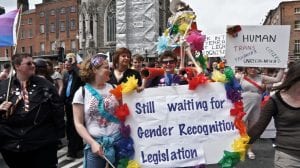By Prof Joanne Conaghan (University of Bristol Law School)
 The recent debate on gender recognition reform, as played out in the press and on social media, has been painful to behold. With passions running high, much of the discourse has been marked by a lack of regard for the viewpoints of others, on occasion spiralling into professional and even personal abuse online. That the pursuit of equality should unleash such unkind sensibilities is troubling, particularly in a feminist context in which values such as inclusion, empathy, and respect for different standpoints have generally commanded wide respect.
The recent debate on gender recognition reform, as played out in the press and on social media, has been painful to behold. With passions running high, much of the discourse has been marked by a lack of regard for the viewpoints of others, on occasion spiralling into professional and even personal abuse online. That the pursuit of equality should unleash such unkind sensibilities is troubling, particularly in a feminist context in which values such as inclusion, empathy, and respect for different standpoints have generally commanded wide respect.
What lies behind the apparent deadlock in debate between transgender activists and ‘gender critical’ feminists? On the one hand, there is the perfectly proper concern of trans people to have access to a legal process of gender recognition which they do not experience as invasive, cumbersome, and pathologizing. On the other, there are misgivings expressed by some in the feminist community that a legal regime of gender recognition, understood as ‘self-declaration’ and operating in various forms in Argentina, Belgium, Brazil, Chile, Columbia, Denmark, Ireland, Malta and Norway, will weaken the hard-won gains of decades of feminist activism particularly with regard to securing women’s access to safe sex-segregated spaces such as rape crisis centres and women’s refuges. The fact that existing equality legislation already provides a level of protection allowing same-sex service providers to deny access to transgender individuals where they can show this is a proportionate means of achieving a legitimate aim (for example, a counselling service might reasonably be concerned that sexually abused women will be less likely to attend group counselling if ‘male-bodied’ trans women are also in attendance)[1] does not seem to have allayed these concerns, though surely they should, particularly as the Government has made clear that they have no plans to change equality law. (more…)
